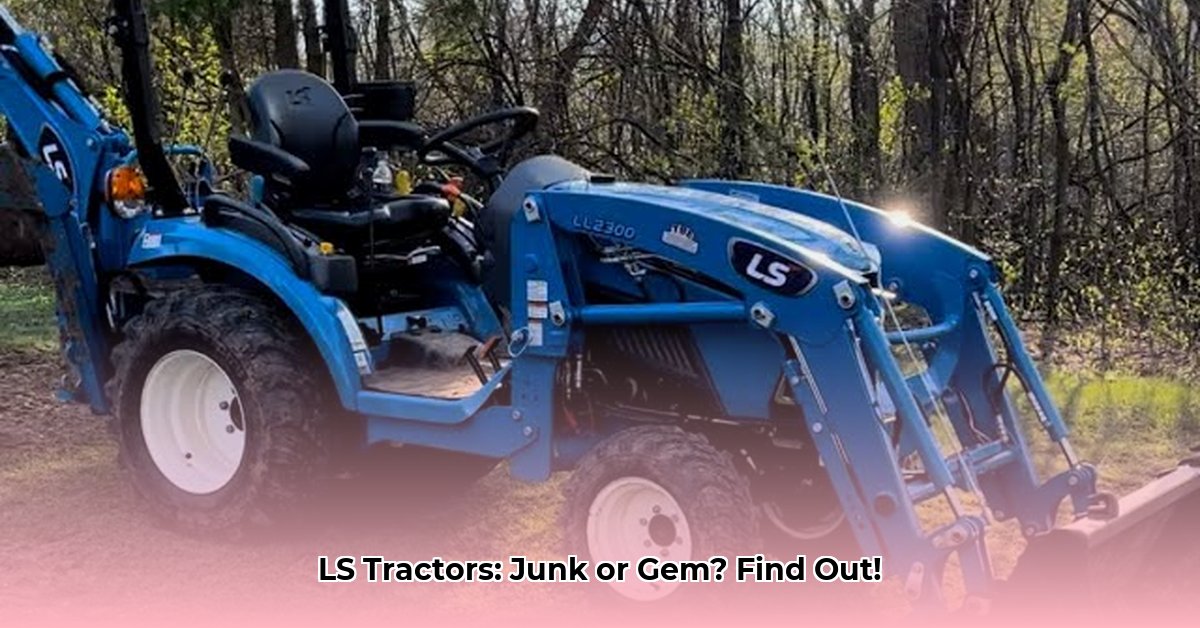
Thinking about buying an LS tractor? You've likely encountered mixed reviews. This isn't a simple "yes" or "no" answer. This review examines LS tractors, weighing user experiences to help you decide if one's right for you. We'll compare them to Kubota and John Deere and offer advice to minimize potential risks.
The Upsides of LS Tractors: What Owners Like
LS tractors boast a significant advantage: affordability. Their lower price point makes them attractive to budget-conscious buyers. Many owners report satisfactory performance for tasks like hay baling and light tillage. One satisfied owner stated, "For the money, my LS tractor has been a workhorse in the hay field – I couldn't ask for more!" This positive feedback highlights a key benefit for some. Furthermore, some users report surprisingly strong resale value under certain circumstances.
The Downsides: Where LS Tractors Fall Short
However, significant drawbacks exist. A prevalent complaint concerns service and parts availability. Finding timely service can be challenging, particularly for older models. Extended delays in getting parts, and reports of incorrect or damaged shipments are common. Warranty service is another frequent point of contention, with many owners reporting long waits for repairs. One frustrated owner commented, "It feels like I spend more time waiting for parts than actually using the tractor!" This underscores a major drawback reported by many users. Resale value is generally lower than that of Kubota and John Deere.
LS Tractors Compared: Price vs. Performance
LS tractors' lower initial cost is undeniable. However, this often necessitates compromises. While performance in some tasks might be comparable, service and parts availability frequently lag behind established brands. It's a trade-off: are initial cost savings worth potential future headaches? This is a crucial question to ask yourself before making a purchase.
Smart Strategies to Minimize Risks When Buying an LS Tractor
Purchasing a tractor is a substantial investment. These steps help mitigate risks:
Thorough Dealer Research: Research local dealerships thoroughly. Look for positive online reviews and a history of reliable service. Talking to other LS Tractor owners in your area can provide invaluable insights.
Professional Pre-Purchase Inspection: A pre-purchase inspection by a qualified mechanic is essential. This independent assessment can reveal potential mechanical issues not immediately apparent.
Negotiate Your Warranty: Don't simply accept the standard warranty; negotiate for extended coverage. A longer or more comprehensive warranty provides a crucial safety net against unexpected repairs.
Total Cost of Ownership Analysis: Calculate total cost of ownership. Factor in initial price, potential repair costs, downtime, and lower resale value. This long-term perspective helps prevent unforeseen expenses.
Key Differences: LS Tractors vs. Kubota/John Deere
| Factor | LS Tractors | Kubota/John Deere |
|---|---|---|
| Initial Purchase Price | Significantly Lower | Significantly Higher |
| Parts Availability | Potentially More Difficult | Generally Easier to Source |
| Dealer Support | May Vary Widely; Research is Crucial | Typically More Reliable |
| Resale Value | Generally Lower | Generally Higher |
| Performance | Comparable for basic tasks; may underperform in specialized applications | Often Superior, especially in demanding situations |
The Verdict: Are LS Tractors Right for You?
Whether an LS tractor suits you depends on individual needs and priorities. If budget is extremely tight and you primarily need a tractor for simple tasks, an LS tractor might be considered. However, if reliability and ease of service are paramount, Kubota or John Deere are likely better long-term investments. This review offers a balanced perspective; thorough research is crucial before purchasing.